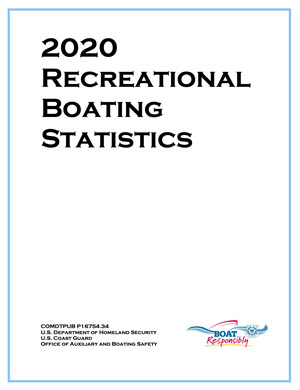USCG releases Recreational Boating Statistics 2020
Total number of accidents, injuries, and deaths were up significantly in 2020.
2020 USCG BARD reported accident statistics were 5,265 accidents, 3,191 injuries, and 767 deaths
2019 USCG BARD reported accident statistics were 4,168 accidents 2,559 injuries, and 613 deaths.
The email USCG sent out announcing the new statistics included the statement below about the significant increase in accidents, injuries, and deaths.
“The Coast Guard is still analyzing data, but believes that the primary driving factor for the significant increase in deaths was a significant increase in boating activity. There is evidence that boating activity rose significantly during the pandemic, from reports of increased boat sales, insurance policies taken out, insurance claims, and calls for towing assistance.”
Continued reading of USCG’s announcement states not only was boating activity up, but the number of deaths per 100,000 registered vessels was up 25 percent over 2019 as well.
At previous U.S. Coast Guard National Boating Safety Advisory Council (NBSAC) meetings we have heard an increasing portion of accidents in previous years is due to the increasing popularity of non-powered vessels (kayaks, canoes, standup paddleboards, etc).
Similarly, propeller accidents, injuries, and deaths were considerably up in 2020.
2020 USCG BARD reported 247 propeller accidents, 241 injuries, and 39 deaths.
2019 USCG BARD reported 171 propeller accidents, 155 injuries, and 35 fatalities.
Propeller accidents were noticeably up in 2020 (up from 171 in 2019 to 247 in 2020)
USCG’s Official News Release provides some additional information.
Thanks to all those at USCG whose efforts helped make this annual statistical report of boating accidents possible.
We would also like to thank USCG, law enforcement officials, lake patrols, first responders, good samaritans, nurses and physicians, life flight teams, paramedics, those offering boating safety classes, boat safety equipment check points, safe boaters, state boating law administrators, life jacket loaner program participants, Operation Dry Water, those spreading boating safety messages, and all others who work tirelessly to drive these annual totals down.
Plus we thank the many search and dive teams that respond when things go bad and are able to help bring closure to the friends and families of those lost.
Plus thanks to all the state boating law administrators and all the officers in the field filling out the accident reports, and to the individuals that self reported their accidents.
And to those continuing to improve the accuracy and completeness of boat accident reports.
